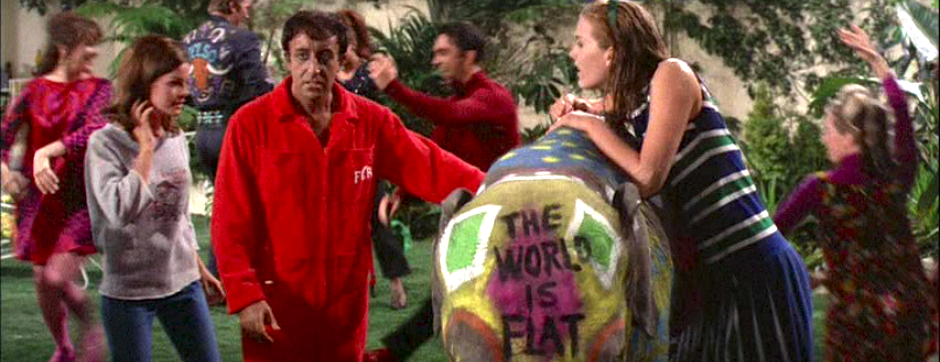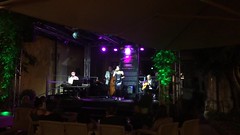Reporting live from the forefront at FRN’s On-line Learning Seminar
Today we worked on Authentic Learning tasks: here are two examples from courses I developed.
a) Computing literacy course (Web-based, hybrid)
A group collaborative task, to be carried out on- and off-line. Design a travel itinerary with a specific objective (i.e. adventure, culture, fun, romantic, etc.). First, choose among a set of “not usual” journey proposals (for instance, from Istanbul to Tehran); then follow the guidelines. Use the Web to gather travel information (specific, concrete) on transportation, accomodation etc. Generate a map, collect images. Last, design a travel brochure (using the provided desktop publishing software) to illustrate your concept (again, follow a set of predefined rules).
b) Teaching On-line course (Web-based, fully on-line)
A group collaborative task, to be carried out on-line. Collaborate with participants in your (predefined) group and design a complete didactic task for a course of yours. The material will be in multimedia format; participants are encouraged to use video/images pulled from the Web (YouTube, etc). The material will also use Web resources liberally, but “creatively”. The task must be organized around these points (students may modify the pattern):
-Explain: prepare the terrain for battle/game/study.
-Assign work (with clarity); project high expectations to your prospective students.
-Then, discuss the experience.
Use a (given) wiki space to collaborate and produce the (possibly linked) document(s) to support your project.
Both tasks are “authentic tasks” since they:
- Have real-world relevance (they are about real problems to be solved with real tools)
- Ill-defined. No full definition of project is given, nor complete 1-2-3 instructions. Participants must break the task down into easier pieces. Must show some intentionality.
- Comprise complex tasks to be investigated by students over a sustained period of time.
- Provide the opportunity for students to examine the task from different perspectives, using a variety of resources The second task certainly allow this. The first, I’m not sure.
- Provide the opportunity to collaborate Collaboration is integral to the tasks!
- Provide the opportunity to reflect
- Can be integrated and applied across different subject areas and lead beyond domain-specific outcomes
- Are seamlessly integrated with assessment
- Authentic tasks create polished products valuable in their own right rather than as preparation for something else Tasks culminate in the creation of a whole products.
- Allow competing solutions and diversity of outcome.
I am not too clear on this…
Today we also shared a lot of resources, from chemistry simulations to Language labs, that use the “authentic” approach.
I gave an improvised presentation of Moodle (moodle.org) and the way I use it in my courses, especially in the HETS Teaching On-line course (TOL: instructions on how to enter a demo are in the Seminar’s Discussion Board).
Last, I’m am supposed to write something about my experience with wikis and blogs.
Well, I’m using wikis in the TOL, and I just described the way I use them above. Moodle has incorporated wikis within its modules and activities, so it’s reaaly easy to add a wiki module in a Moodle course. We were told one can do pretty much the same in Blackboard.
Now, Blogs!
Well, I love blogs both as reading and participating material and as a writing and publication form. I have started this very blog (Skate of the Web) some time ago, and with more or less continuity I have been posting my ramblings on education, culture and whatever Web, in English and Spanish.
I was fortunate to participate in the First Puerto Rican Congress on Educational Blogs (Edublogs 2007) at UPR Mayuagüez. Here is my presentation: Livin’ the Web: Blogs, Wikis y otros monstruos del.icio.sos (pdf) and video.
That’s all folks (for today)!




Antonio – seeing the way(s) you use Moodle, with the demo today (Wednesday) about how Phyllis is using it, I’m totally sold. (Now I just have to get our early-adopter tech guy to install it on the University servers!) Thanks. -Richard
Antonio, I really appreciated your Moodle demo. It gives me lots of questions to take home to our IT people. And I loved the “travel itinerary” assignment; it would make students acquire/demonstrate a variety of skills, from web search to public relations/advertising. Plus it allows them to map (quite literally) their own way. That’s one of the big problems I have with authentic assignments; I always try to make the assignments as clear and structured as possible. I’m learning that being structured at all times is not necessarily being a good teacher–quite an eye-opener. –Linda
Thanks for the demo—it was informative and answered many of my questions.
Jim